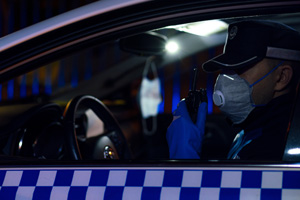 A DUI/DWI checkpoint is a temporary roadblock created by police officers to check for signs of intoxication in drivers. Law enforcement hopes to protect others from drunk drivers with these sobriety checkpoints. Any sign of possible impairment may cause an officer to pull you over, check your blood alcohol content (BAC), and perform a field sobriety test (FST).
A DUI/DWI checkpoint is a temporary roadblock created by police officers to check for signs of intoxication in drivers. Law enforcement hopes to protect others from drunk drivers with these sobriety checkpoints. Any sign of possible impairment may cause an officer to pull you over, check your blood alcohol content (BAC), and perform a field sobriety test (FST).
If your BAC is 0.08% or higher, you will face a DUI/DWI conviction. However, there are medical conditions, medications, and other reasons your BAC may be higher than average. Unless your blood alcohol level is 0.08% or higher, an officer can not arrest you with a conviction of a DUI or DWI. They may use field sobriety tests to validate their assumption, but FSTs cannot determine whether an individual is intoxicated to the point of an arrest.
4 Steps to Take After a DUI/DWI Checkpoint in Texas
The aftermath of a DUI/DWI checkpoint can go two ways; either you are arrested for driving while under the influence, or an officer will let you continue on your way. Handling the aftermath of a checkpoint is challenging and may put you at risk. The following are a few steps to take after a DUI/DWI checkpoint.
Take a Deep Breath
Regardless of whether you were arrested or are leaving the checkpoint, it is important to steady yourself and think clearly. Taking a moment to breathe and calm down is vital for your health and safety. An arrest may make you feel overwhelmed and upset, but taking a deep breath will help you realign yourself.
Follow the Police’s Orders
Throughout your time speaking with the officer, you must follow their directions. Even if you believe it is unnecessary and pointless, following their instructions will show that you are still coherent. They will not be able to use your behavior as an indicator of impairment.
Know Your Rights
While staying polite and following an officer’s instructions is essential, you can still assert your rights if an officer treats you wrongfully or violates the law. Civilly remind them that they are infringing upon your protected rights, including:
- Deny a car search: The only time an officer can search your vehicle is if there is probable cause. If there is no evidence, you have the right to decline a car search.
- Remain silent: You have no obligation to speak about whether or not you’ve been drinking or answer any questions they ask.
- Dispute illegal detention: An officer must have a reason to arrest you, as well as evidence of probable cause. They cannot keep you there longer than it takes to check your license, insurance, and registration.
Knowing your rights as a Texas resident can protect you in unfortunate situations. If an officer continues to infringe upon your rights, immediately contact a lawyer.
Speak with a Lawyer
As a Texas resident, you have the rights that a law enforcement officer must consider when charging you with a DUI/DWI. If you are wrongfully convicted without evidence, speak with a lawyer as soon as possible.
DUI/DWI checkpoints are stressful, even for those who haven’t been drinking. If you are arrested for a DUI/DWI and need legal representation, contact Sophia Martinez Law as soon as possible.
Seek a Texas DUI/DWI Lawyer at Sophia Martinez Law
If you are arrested at a DUI/DWI checkpoint and require legal representation, speak with Sophia C. Martinez as soon as possible. With years of experience advocating for Texas residents’ rights, she understands what is needed for a smooth and successful case. In order to make all her clients feel comfortable discussing their concerns, she offers her services in both English and Spanish.
Our team at Sophia Martinez Law knows how challenging a DUI/DWI conviction is and will do everything in our power to make sure you have the best possible outcome for your claim. Call (210) 226-3000 or fill out our contact form for more information on how we can help you.
